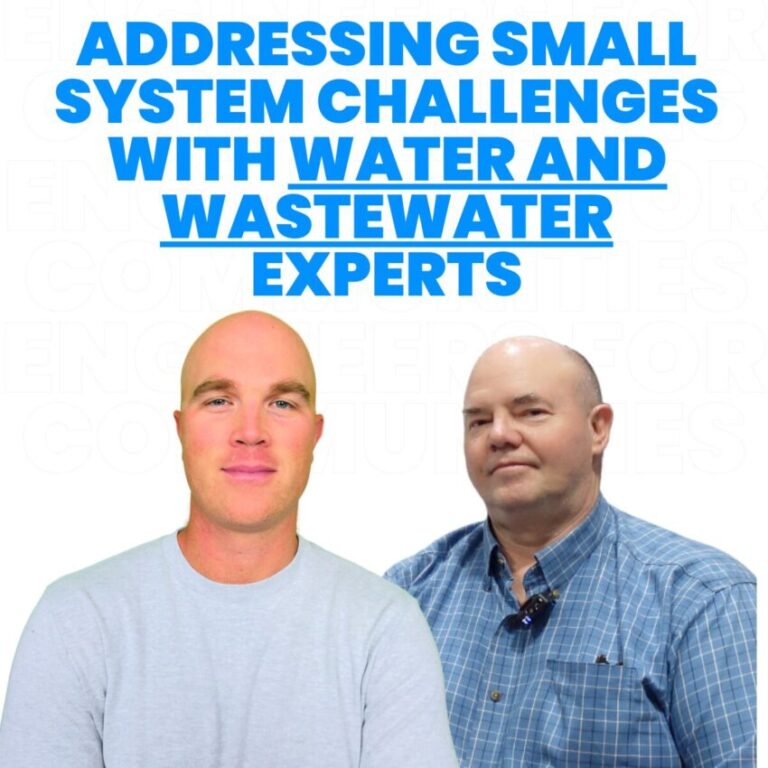How WaterOperator.org Solves Small Water System Crisis: Free Resources That Actually Work
In this episode of Engineers for Communities, we spoke with Steve Wilson from WaterOperator.org about tackling one of today’s most critical infrastructure challenges: supporting small water systems serving under 10,000 people. These rural communities face unique operational, financial, and technical hurdles that larger utilities never encounter. Steve shared insights into these problems and practical solutions that can make a real difference.
What Makes Small Water Systems Different?
Small water systems face a perfect storm of challenges that threaten their long-term sustainability. Steve’s organization, funded by EPA through RCAP (Rural Community Assistance Partnership), has been providing free resources since 2009 to help these systems survive and thrive.
The biggest issue? Knowledge management. As Steve puts it, “There’s so many small systems where it’s all in the operator’s head.” When that operator retires or takes a better job with a larger utility, the replacement has to start from scratch figuring out how the system actually works.
How WaterOperator.org Works
WaterOperator.org serves as a comprehensive clearinghouse of information specifically designed for small system operators. The platform makes it easy for operators to find technical resources, training materials, and expert guidance without the overwhelming complexity of resources designed for large utilities.
The system is remarkably simple: operators can search the website for specific information, and if they can’t find what they need, they can email or call directly. Steve’s team will track down the information and provide it at no cost to the community.
What makes this approach special is the focus on practical solutions rather than theoretical knowledge. Small system operators often lack formal engineering training but need actionable guidance for immediate problems.
Real-World Impact
The numbers tell the story of just how critical this resource has become. Many states actively promote WaterOperator.org to their small system operators because the free technical assistance fills gaps that state agencies can’t address directly.
For water loss problems – which can reach 75% in extreme cases – the organization connects communities with RCAP technical assistance providers who conduct comprehensive water loss surveys at no charge. These aren’t generic assessments; they’re detailed investigations that identify specific leak locations and quantify losses.
Why It’s Better Than Current Options
WaterOperator.org addresses several key advantages over traditional support methods:
Free Technical Assistance: Unlike consulting services that charge for every interaction, all resources and direct assistance come at no cost to struggling communities.
Operator-Focused Content: Information is presented in formats that make sense for operators without extensive technical training, rather than engineering documents written for professionals.
Comprehensive Coverage: The platform covers both water and wastewater systems because, as Steve noted, “one person in a lot of these small towns is running both.”
Direct Problem-Solving: When operators can’t find answers online, they get personal assistance to track down solutions rather than being directed to generic resources.
Breaking the Training Cycle
One of the most insightful observations Steve shared was the “minor league to major league” problem facing small systems. Large utilities like Denver Water and American Water consistently hire away trained operators from small communities after they gain experience and higher certifications.
Steve’s proposed solution mirrors professional baseball: major league utilities should support their feeder systems rather than just poaching talent. This could involve shared training programs, technical backup during emergencies, and partnership agreements that benefit both small and large systems.
Getting to Market
WaterOperator.org represents a proven model that’s been successfully operating for over 15 years with EPA funding. The platform demonstrates that centralized technical assistance can effectively support distributed small systems across multiple states.
As small communities face increasing regulatory requirements and aging infrastructure, centralized resource platforms become even more critical. The model proves that targeted assistance specifically designed for small system realities can make a meaningful difference in operational sustainability.
Conclusion
Small water system challenges require specialized solutions that understand the unique constraints these communities face. Resources like WaterOperator.org demonstrate that free, targeted technical assistance can help small systems maintain safe, reliable water service without overwhelming their limited resources.
This episode of Engineers for Communities highlights how practical support systems are making the difference between sustainable operations and system failure in rural America. For more information, visit WaterOperator.org and access the free resources designed specifically for systems serving under 10,000 people.

